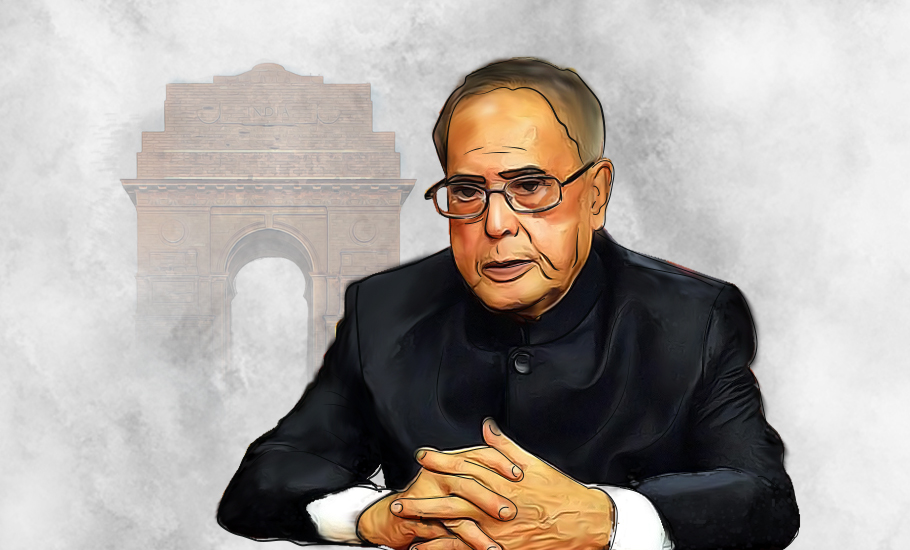
Pranabda: A Nehruvian statesman, a Bengali high priest who broke stereotypes

From an erudite, pipe-smoking Bengali Bhadralok to pattabastra (a silk cloth worn for worshipping) adorned priest, Pranab Mukherjee could morph into various avatars with an equal élan in which he handled multiple government responsibilities.
Every year Mukherjee would descend to Miriti village in Birbhum district, about 200 km from Kolkata to play the high priest at the traditional Durga Puja at his ancestral home, an annual celebration started over 125 years ago by his grandfather Jangaleswar Mukherjee.
A deeply religious person, he would personally perform the puja chanting mantras and doing Chandi Path, a recitation of 700 powerful mantras of ‘Durga Saptashati’, written as an ode to Goddess Durga. In all the four days of the puja — from Sashti to Bijoya Dashami — he would keep fast until the rituals were over.
He, occasionally, used the knowledge of the scriptures in Parliament to stump members of the BJP who would pretend to be the sole custodians of Hindu traditions and customs. In one such debates over Hinduism during the NDA regime, after Mukherjee defanged the saffron camp quoting Sanskrit mantras, the then Prime Minister Atal Bihari Vajpayee had quipped: “I had warned Dr Joshi (Murli Manohar), he should not take punga with you in religious matters.”
Though a deeply religious person, Mukherjee was considered by many as leftist in his ideals, particularly for his economic policies. Pranabda (or Poltuda in his native village) as he was fondly called, wore contradictions on his sleeve.
It was this contradiction in display again when a Nehruvian liberal and a Congressman Mukherjee almost did a political blasphemy addressing RSS workers at the Sangh Shiksha Varg in Nagpur, the Sangh’s headquarters in 2018.
To his credit, he could reconcile divergent ideas as had been manifested during his much-talked about rendezvous with the RSS. His speech in Nagpur was hailed both by the liberals and right-wingers.
Related News: Former President Pranab Mukherjee passes away at 84
The liberals, who had thought of crucifying him for his gross misdemeanour, made a volte face and lauded him for telling the RSS that the “Soul of India resides in pluralism and tolerance. This plurality came with assimilation of ideas over centuries. Secularism is a matter of faith for us.”
“Our national identity has emerged after a long drawn process of confluence and assimilation, the multiple cultures and faiths make us special and tolerant… Nationalism is all about inclusivity,” he further went on to add much to the delight of the liberals.
The right-wing protagonists were happy that minutes before Mukherjee delved on India’s pluralism, he had hailed Keshav Baliram Hedgewar, the founder of the Rashtriya Swayamsevak Sangh (RSS), as “a great son of Mother India.”
Undoubtedly, he was one of the most respected statesmen-politicians of his time, known for his vast learning and knowledge. Yet, he always carried the tell-tale signs of his non-elitist rural background. Many well-bred, English-educated elite in Kolkata often cracked jokes at his English pronunciation. Despite his long-stint in the national capital, Mukherjee’s Hindi was atrocious to say the least.
Pranabda was always very humble about his background though he did not exactly have a non-descript past. He might not have gone to an elite public school, but Pranabda had in his kitty postgraduate degrees in modern history and political science as well as a law degree from Calcutta University.
Mukherjee was also no stranger to politics when he started his active-political career in the mid-1960s, joining Ajoy Mukherjee’s Bangla Congress, a splinter group of the West Bengal unit of the Indian National Congress.
His father Kamada Kinkar Mukherjee was a freedom fighter and a member of the West Bengal Legislative Council.
In his own words, his was the story of a “boy who moves from a flickering lamp in a remote village in West Bengal to the glittering chandeliers of India’s national capital.”
Both under the flickering lamp and glittering chandeliers, Pranabda shone equally bright for he never allowed himself to be stereotyped.


